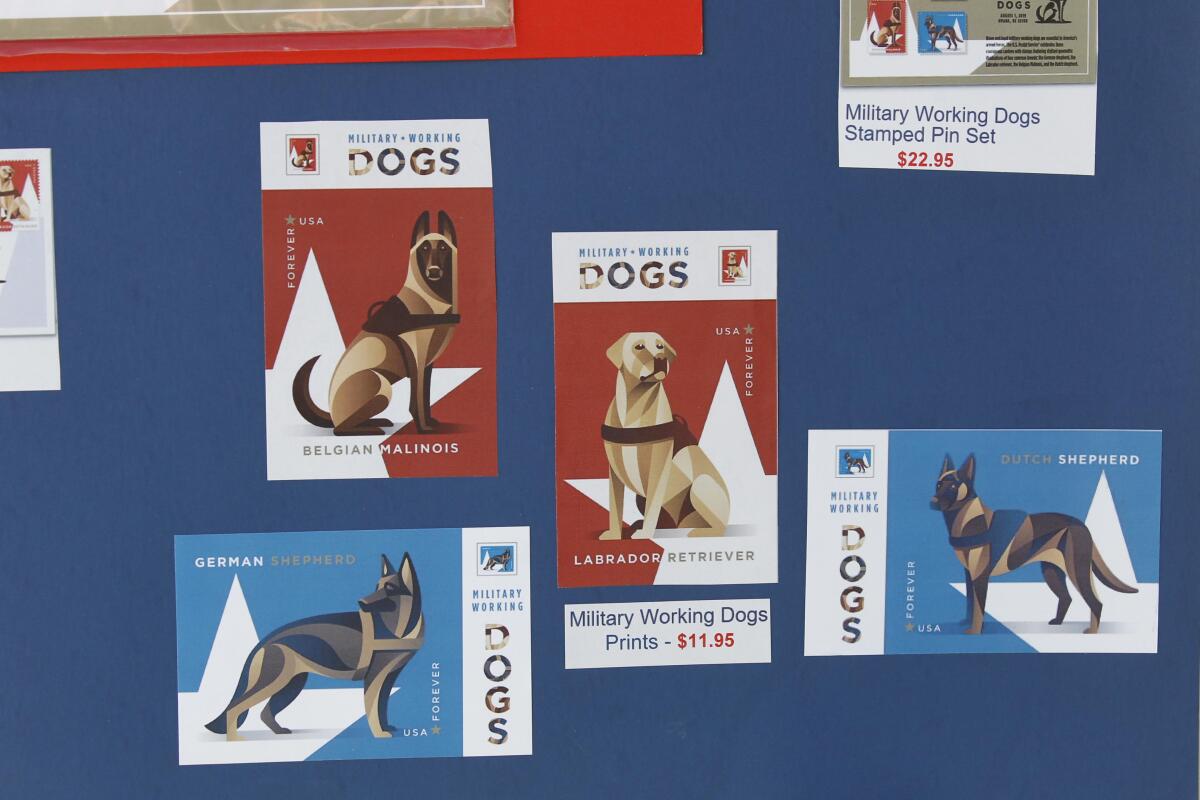Forever stamps’ 5-cent price jump is struck down by appeals court

- Share via
A record 10% price rise in the U.S. Postal Service’s 50-cent Forever stamp was struck down by a federal appeals court, which sided with a San Francisco man who said the arbitrary boost set an improper benchmark for future increases in the cost of mailing a letter.
Stamp prices aren’t falling, though — at least for now.
The postal service, which reported a $2.3-billion third-quarter loss, said it chose a 5-cent increase to 55 cents partly because it made calculating the cost of buying multiple stamps easier than a 2-cent jump to 52 cents. But a non-practicing attorney named Douglas Carlson, who says he is a lifelong postal enthusiast, filed an objection in December and pursued the case on his own.
“Although the 5-cent stamp price hike may have gone unnoticed by many, the American Revolution was fomented in part by ordinary people who objected to taxation through stamps,” U.S. Circuit Judge Neomi Rao wrote in a unanimous 26-page rebuke to an increase adopted in January. The court ruled that the increase was arbitrary and capricious.
The language used by Rao, who was appointed to the Washington court by President Trump this year, was a hat-tip to Carlson, who works as a registrar for UC San Francisco.
As millions around the world prepare to usher in the Year of the Boar on Feb. 5, the U.S.
Contacted by telephone, Carlson said he was pleased with the ruling. He recounted a lifelong interest in the postal service that grew out of an early fascination with how mail was processed and sorted, then turned to rates, regulations and consumer advocacy in the 1990s.
Although he has fought other battles with the service over rates and mail-collection times, he said Friday’s ruling was his biggest “for nationwide impact.”
The court’s decision could be a blow to the postal service, which reported Aug. 9 that third-quarter revenue from first-class mail slid by $98 million, a 1.6% drop from the same quarter last year.
The 5-cent increase had been approved by the Postal Regulatory Commission, which oversees the postal service and was created in part to ensure rate stability, predictability and “simplicity of structure.” A commission spokeswoman said in an email that the commission “is reviewing the court’s order and coordinating with the Department of Justice.”
At this time, customers will still be charged the new January rates for first-class mail, including 55 cents for a Forever stamp, a postal service spokesman confirmed Friday.
Carlson argued that the commission had erred in approving a price rise of 5 cents instead of 2 cents, saying the increase could be a prelude to continued 5-cent increases.
Rather than raising the cost of a Forever stamp to 56 or 57 cents in the future, “the Postal Service likely will remind the public of this plan and raise the price to 60 cents to maintain divisibility by five,” Carlson said. That would compel individuals and small businesses to pay more than they might otherwise, and sooner, Carlson said.
The appeals court agreed, concluding the commission failed to provide an adequate explanation for the rate increase and didn’t respond to public comments, including Carlson’s, in violation of the federal Administrative Procedure Act, which governs government rule-making. The panel invalidated related first-class mail rate adjustments too.
Joining in Rao’s opinion were U.S. circuit judges Greg Katsas, who was also a Trump nominee, and Patricia Millett, a selection of then-President Obama.
The Associated Press was used in compiling this report.
More to Read
Inside the business of entertainment
The Wide Shot brings you news, analysis and insights on everything from streaming wars to production — and what it all means for the future.
You may occasionally receive promotional content from the Los Angeles Times.










